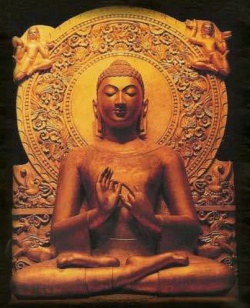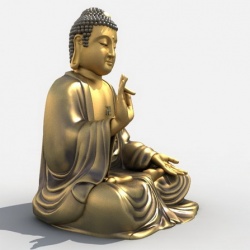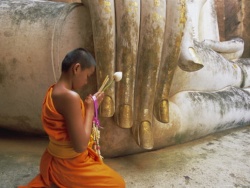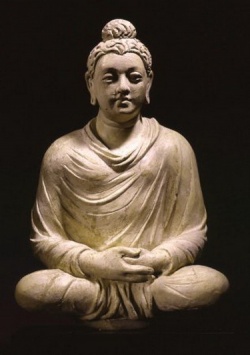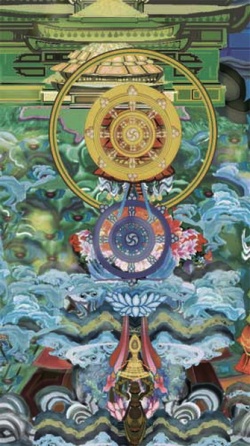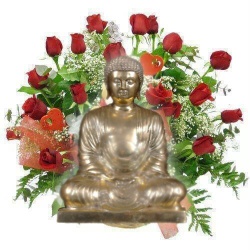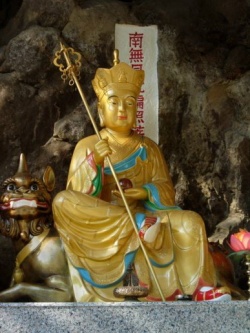The Gospel of Buddha:Chapter 99: The Purpose of Being
Eternal verities dominate the formation of worlds
and constitute the cosmic order of natural laws.
But when, through the conflicting motion of masses,
the universe was illuminated with blazing fire,
there was no eye to see the light,
no ear to listen to reason's teachings,
no mind to perceive the significance of being;
and in the immearsurable spaces of existence no place was found
where the truth could abide in all its glory. [1]
In the due course of evolution sentiency appeared and sense-perception arose.
There was a new realm of being, the realm of soul-life, full of yearning,
with powerful passions and of unconquerable energy.
And the world split in twain:
there were pleasures and pains,self and notself,
friends and foes,
hatred and love.
The truth vibrated through the world of sentiency,
but in all its infinite potentialities no place could be found
where the truth could abide in all its glory. [2]
And reason came forth in the struggle for life.
Reason began to guide the instinct of self,
and reason took the sceptre of the creation
and overcame the strength of the brutes and the power of the elements.
Yet reason seemed to add new fuel to the flame,
increasing the turmoil of conflicting passions;
and brothers slew their brothers
for the sake of satisfying the lust of a fleeting moment.
And the truth repaired to the domains of reason,
but in all its recesses no place was found
where the truth could abide in all its glory. [3]
Now reason, as the helpmate of self,
implicated all living beings more and more
in the meshes of lust, hatred, and envy,
and from lust, hatred, and envy
the evils of wrong-doing originated.
Men broke down under the burdens of life,
until the saviour appeared, the great Buddha,
the Holy Teacher of men and gods. [4]
And the Buddha taught men the right use of sentiency,
and the right application of reason;
and he taught men to see things as they are, without illusions,
and they learned to act according to the truth.
He taught righteousness
and thus changed rational creatures into humane beings,
just, kind-hearted, and faithful.
And now at last a place was found
where the truth might abide in all its glory,
and this place is the heart of mankind. [5]
Buddha, O Blessed One,
O Holy One, O Perfect One,
thou hast revealed the truth,
and the truth has appeared upon earth
and the kingdom of truth has been founded. [6]
There is not room for truth in space,
infinite though it be. [7]
There is not room for truth in sentiency,
neither in its pleasures nor in its pains;
sentiency is the first footstep of truth,
but there is not room in it for truth,
though sentiency may beam
with the blazing glow of beauty and life. [8]
Neither is there any room for truth in rationality.
Rationality is a two-edged sword
and serves the purpose of love
equally as well as the purpose of hatred.
Rationality is the platform on which the truth standeth.
No truth is attainable without reason.
Nevertheless, in mere rationality there is no room for truth,
though it be the instrument that masters the things of the world. [9]
The throne of truth is righteousness;
and love and justice and good-will are its ornaments. [10]
Righteousness is the place in which truth dwells,
and here in the hearts of mankind
aspiring after the realization of righteousness,
there is ample space for a rich
and ever richer revelation of the truth. [11]
This is the Gospel of the Blessed One.
This is the revelation of the Enlightened One.
This is the bequest of the Holy One. [12]
Those who accept the truth and have faith in the truth,
take refuge in the Buddha, the Dharma, and the Sangha. [13]
Receive us, O Buddha, as thy disciples
from this day hence, so long as our life lasts. [14]
Comfort, O holy Teacher, compassionate and all-loving,
the afflicted and the sorrow-laden, illumine those who go astray,
and let us all gain more and more in comprehension and in holiness. [15]
The truth is the end and aim of all existence,
and the worlds originate so that the truth may come and dwell therein. [16]
Those who fail to aspire for the truth
have missed the purpose of life. [17]
Blessed is he who rests in the truth,
for all things will pass away,
but the truth abideth forever. [18]
The world is built for the truth,
but false combinations of thought
misrepresent the true state of things
and bring forth errors. [19]
Errors can be fashioned
as it pleases those who cherish them;
therefore they are pleasant to look upon,
but they are unstable and contain the seeds of dissolution. [20]
Truth cannot be fashioned.
Truth is one and the same;
it is immutable. [21]
Truth is above the power of death,
it is omnipresent, eternal, and most glorious. [22]
Illusions, errors, and lies are the daughters of Mara,
and great power is given unto them to seduce the minds of men
and lead them astray upon the path of evil. [23]
The nature of delusions, errors, and lies is death,
and wrong-doing is the way to perdition. [24]
Delusions, errors, and lies
are like huge, gaudy vessels,
the rafters of which are rotten and wormeaten,
and those who embark in them
are fated to be shipwrecked. [25]
There are many who say:
"Come error, be thou my guide,"
and when they are caught
in the meshes of selfishness, lust, and evil desires,
misery is begot. [26]
Yet does all life yearn for the truth
and the truth only can cure our diseases
and peace to our unrest. [27]
Truth is the essence of life,
for truth endureth beyond the death of the body.
Truth is eternal and will still remain
even though heaven and earth shall pass away. [28]
There are not different truths in the world,
for truth is one and the same
at all times and in every place. [29]
Truth teaches us the noble eightfold path of righteousness,
and it is a straight path easily found by the truth-loving.
Happy are those who walk in it. [30]
Continue Reading
- The Gospel of Buddha: Preface
- The Gospel of Buddha:Chapter 01: Rejoice
- The Gospel of Buddha:Chapter 02: Samsara and Nirvana
- The Gospel of Buddha:Chapter 03: Truth the Saviour
- The Gospel of Buddha:Chapter 04: The Bodhisatta's Birth
- The Gospel of Buddha:Chapter 05: The Ties of Life
- The Gospel of Buddha:Chapter 06: The Three Woes
- The Gospel of Buddha:Chapter 07: The Bodhisatta's Renunciation
- The Gospel of Buddha:Chapter 08: King Bimbisara
- The Gospel of Buddha:Chapter 09: The Bodhisatta's Search
- The Gospel of Buddha:Chapter 10: Uruvela, the Place of Mortification
- The Gospel of Buddha:Chapter 11: Mara, the Evil One
- The Gospel of Buddha:Chapter 12: Enlightenment
- The Gospel of Buddha:Chapter 13: The First Converts
- The Gospel of Buddha:Chapter 14: Brahma's Request
- The Gospel of Buddha:Chapter 15: Upaka
- The Gospel of Buddha:Chapter 16: The Sermon at Benares
- The Gospel of Buddha:Chapter 17: The Sangha
- The Gospel of Buddha:Chapter 18: Yasa, the Youth of Benares
- The Gospel of Buddha:Chapter 19: Kassapa
- The Gospel of Buddha:Chapter 20: The Sermon at Rajagaha
- The Gospel of Buddha:Chapter 21: The King's Gift
- The Gospel of Buddha:Chapter 22: Sariputta and Moggallana
- The Gospel of Buddha:Chapter 23: Anathapindika
- The Gospel of Buddha:Chapter 24: The Sermon on Charity
- The Gospel of Buddha:Chapter 25: Jetavana
- The Gospel of Buddha:Chapter 26: The Three Characteristics and the Uncreate
- The Gospel of Buddha:Chapter 27: The Buddha's Father
- The Gospel of Buddha:Chapter 28: Yasodhara
- The Gospel of Buddha:Chapter 29: Rahula
- The Gospel of Buddha:Chapter 30: Jivaka, the Physician
- The Gospel of Buddha:Chapter 31: The Buddha's Parents Attain Nirvana
- The Gospel of Buddha:Chapter 32: Women Admitted to the Sangha
- The Gospel of Buddha:Chapter 33: The Bhikkhus' Conduct Toward Women
- The Gospel of Buddha:Chapter 34: Visakha
- The Gospel of Buddha:Chapter 35: The Uposatha and Patimokkha
- The Gospel of Buddha:Chapter 36: The Schism
- The Gospel of Buddha:Chapter 37: The Re-establishment of Concord
- The Gospel of Buddha:Chapter 38: The Bhikkhus Rebuked
- The Gospel of Buddha:Chapter 39: Devadatta
- The Gospel of Buddha:Chapter 40: Name and Form
- The Gospel of Buddha:Chapter 41: The Goal
- The Gospel of Buddha:Chapter 42: Miracles Forbidden
- The Gospel of Buddha:Chapter 43: The Vanity of Worldliness
- The Gospel of Buddha:Chapter 44: Secrecy and Publicity
- The Gospel of Buddha:Chapter 45: The Annihilation of Suffering
- The Gospel of Buddha:Chapter 46: Avoiding the Ten Evils
- The Gospel of Buddha:Chapter 47: The Preacher's Mission
- The Gospel of Buddha:Chapter 48: The Dhammapada
- The Gospel of Buddha:Chapter 49: The Two Brahmans
- The Gospel of Buddha:Chapter 50: Guard the Six Quarters
- The Gospel of Buddha:Chapter 51: Simha's Question Concerning Annihilation
- The Gospel of Buddha:Chapter 52: All Existence is Spiritual
- The Gospel of Buddha:Chapter 53: Identity and Non-Identity
- The Gospel of Buddha:Chapter 54: The Buddha Omnipresent
- The Gospel of Buddha:Chapter 55: One Essence, One Law, One Aim
- The Gospel of Buddha:Chapter 56: The Lesson Given to Rahula
- The Gospel of Buddha:Chapter 57: The Sermon on Abuse
- The Gospel of Buddha:Chapter 58: The Buddha Replies to the Deva
- The Gospel of Buddha:Chapter 59: Words of Instruction
- The Gospel of Buddha:Chapter 60: Amitabha
- The Gospel of Buddha:Chapter 61: The Teacher Unknown
- The Gospel of Buddha:Chapter 62: Parables
- The Gospel of Buddha:Chapter 63: The Widow's Two Mites and the Parable of the Three Merchants
- The Gospel of Buddha:Chapter 64: The Man Born Blind
- The Gospel of Buddha:Chapter 65: The Lost Son
- The Gospel of Buddha:Chapter 66: The Giddy Fish
- The Gospel of Buddha:Chapter 67: The Cruel Crane Outwitted
- The Gospel of Buddha:Chapter 68: Four Kinds of Merit
- The Gospel of Buddha:Chapter 69: The Light of the World
- The Gospel of Buddha:Chapter 70: Luxurious Living
- The Gospel of Buddha:Chapter 71: The Communication of Bliss
- The Gospel of Buddha:Chapter 72: The Listless Fool
- The Gospel of Buddha:Chapter 73: Rescue in the Desert
- The Gospel of Buddha:Chapter 74: The Sower
- The Gospel of Buddha:Chapter 75: The Outcast
- The Gospel of Buddha:Chapter 76: The Woman at the Well
- The Gospel of Buddha:Chapter 77: The Peacemaker
- The Gospel of Buddha:Chapter 78: The Hungry Dog
- The Gospel of Buddha:Chapter 79: The Despot
- The Gospel of Buddha:Chapter 80: Vasavadatta
- The Gospel of Buddha:Chapter 81: The Marriage-Feast in Jambunada
- The Gospel of Buddha:Chapter 82: A Party in Search of a Thief
- The Gospel of Buddha:Chapter 83: In the Realm of Yamaraja
- The Gospel of Buddha:Chapter 84: The Mustard Seed
- The Gospel of Buddha:Chapter 85: Following the Master Over the Stream
- The Gospel of Buddha:Chapter 86: The Sick Bhikkhu
- The Gospel of Buddha:Chapter 87: The Patient Elephant
- The Gospel of Buddha:Chapter 88: The Conditions of Welfare
- The Gospel of Buddha:Chapter 89: Sariputta's Faith
- The Gospel of Buddha:Chapter 90: Pataliputta
- The Gospel of Buddha:Chapter 91: The Mirror of Truth
- The Gospel of Buddha:Chapter 92: Ambapali
- The Gospel of Buddha:Chapter 93: The Buddha's Farewell Address
- The Gospel of Buddha:Chapter 94: The Buddha Announces His Death
- The Gospel of Buddha:Chapter 95: Chunda, the Smith
- The Gospel of Buddha:Chapter 96: Metteyya
- The Gospel of Buddha:Chapter 97: The Buddha's Final Entering into Nirvana
- The Gospel of Buddha:Chapter 98: The Three Personalities of the Buddha
- The Gospel of Buddha:Chapter 99: The Purpose of Being
- The Gospel of Buddha:Chapter 100: The Praise of All the Buddhas

